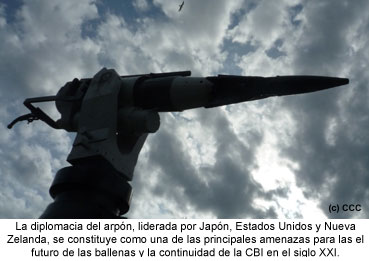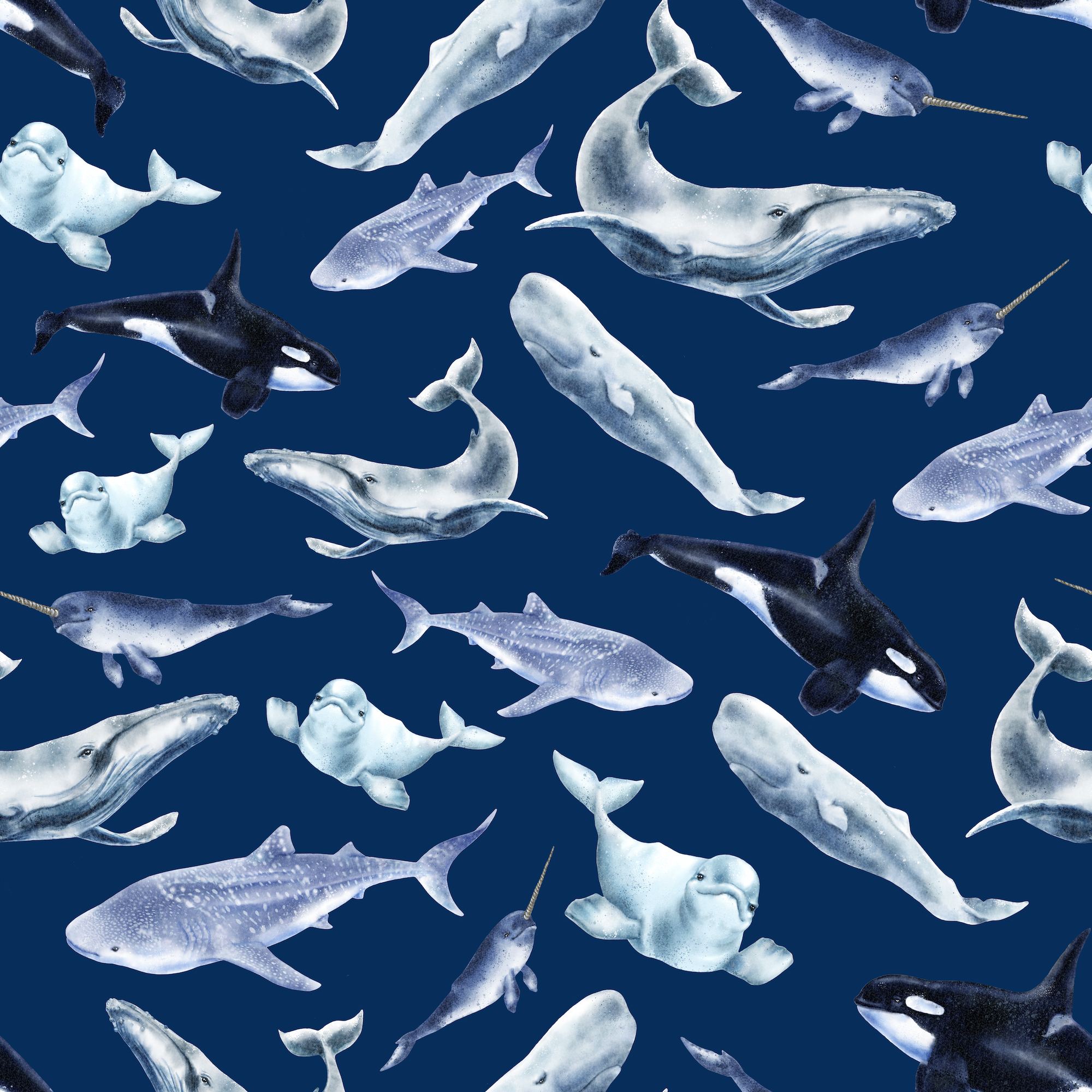Although some seem to consider the results of the last annual meeting of the International Whaling Commission (IWC) as insufficient, this meeting made history as the most important in the defense of governance and democracy within this international body.

After two days of negotiations to adopt by consensus a resolution about transparency and governance, and the subsequent hijacking of the IWC by whaling nations – to obstruct the voting process for the creation of the South Atlantic whale sanctuary – the annual assembly of the IWC could be misguidedly perceived as a waste of time that left important conservation issues out of the meeting.
However both situations unveiled the hypocrisy and manipulation to which several nations act in order to control and impose – through the denial of basic rights of sovereign Commission Member States – an obscure destiny to whale populations worldwide.
A meeting that was anticipated to be passive and inactive ended with the Commission finally forced to face substantive issues that where dropped in the drawer of memories in order to maintain an artificially friendly environment aimed to diplomatically sink the conservation and non lethal use interests of the majority of IWC countries.
Preparations for an Assault Disguised as Consensus
The collapse of all great cetacean species due to the overexploitation of the whaling industry destroyed the credibility of the IWC as the body in charge of “regulating the orderly development of the whaling industry and the conservation of whale populations”. Only the enforcement of the global moratorium on commercial whaling from 1986 prevented the extinction of many of these species and saved the Commission from collapsing from exhaustion and permanent disappearance of the “resources” it was supposed to manage responsibly.
Following the implementation of the moratorium, IWC’s credibility slowly began to rebuild, hand in hand with the increase of some populations of large whales and the generation of new and better alternatives related to the non lethal use of whales. However the vote buying policy of Japan for over a decade within the IWC – that has systematically blocked conservation initiatives – has eroded the still vulnerable credibility of the Commission.
After the scandal revealed by The Sunday Times in 2010 about irregular payments of Japanese officials to Caribbean and African representatives of the IWC, the resolution on transparency and governance that was presented by the United Kingdom in Jersey became the best alternative to address this and other important matters, such as the lack of civil society participation in IWC meetings.
But the harpoon diplomacy consumed two valuable workdays of endless negotiations oriented to weaken basic transparency and governance measures in favor of obscure whaling interests. As a result, the Commission finally adopted a significant but weakened version of the English resolution that, among others, does not improve in any way the current outdated and restrictive system of NGO participation, and will only reduce and not eliminate corrupt practices within the IWC.
However several whaling delegations and supporters of Japanese whaling policies celebrated enthusiastically its adoption as if it meant the consolidation of consensus as the single decision mechanism of the IWC.
Diplomatic Hanging of Democratic Processes in the CBI
Since 2001 Brazil and Argentina – with the support of all the Latin American countries (Grupo Buenos Aires) – have lead a proposal to create a whale sanctuary in the South Atlantic. However the initiative has not been adopted because it requires 75% support of the Commission and the vote buying policy of Japan has always recruited enough countries to assure that it will never reach this percentage of the votes.
But during the annual IWC meeting in Alaska (2007) the number of votes in favor of the creation of the sanctuary reached the historical level of almost 60% of the countries and the Latin American region prepared to put the proposal for a vote during the next year meeting in Santiago de Chile. However the decision of the Commission to begin a negotiation process to define the “future of the IWC” – that required all countries to abstain from addressing conflicting issues (for the whalers, that is) in order to resolve the challenges of the IWC in an harmonic way – prevented the region from putting the proposal to a vote thereafter on behalf of making positive progress in the process.
On the other hand the government of Japan continued to kill whales under the so called “scientific whaling” program in the Southern Ocean whale sanctuary; imported dozens on tons of fin whale (Endangered) from Iceland although international trade of whale products is forbidden; it got involved in a bribery and corruption scandal that unexplainably put the complainants in jail; and evidence of illegal exports of minke whale meat caught in the Southern Ocean whale sanctuary to a fancy restaurant in the United Stated were revealed.
The strategy of this new whaling order seemed to work perfectly for the Japanese government interests and its main allies. Lead by the USA and New Zealand the whaling interests were finally consolidated in 2010 in a proposal for the Future of the IWC that not only seek to eliminate the moratorium but also intended to legitimize “scientific whaling” operations in whale sanctuaries. Fortunately the proposal drastically failed and the negotiation process – along with its consensus policy – finalized after the meeting came to a close in Morocco.
The closure of the negotiation process and certain favorable conditions for the pro conservation block in the IWC 2011 became a unique opportunity to retake conservation and development proposals that are of key importance to the Latinamerican region, such as the creation of the South Atlantic whale sanctuary. In this context, Brazil presented the proposal to the Commission, giving solid biological, ecological and social arguments for its establishment and required its adoption by consensus. Exercising its legitimate right, Brazil also stated that if it was not possible to reach consensus it would put the proposal to a vote.
The IWC recognizes the voting procedure as a basic element of the decision making process when it is not possible to reach agreements by consensus. After the stubborn and unjustifiable opposition of the whaling nations to the creation of the whale sanctuary, Brazil – with the support of Grupo Buenos Aires – exercised the undeniable right of every sovereign Member State of the IWC and put the initiative to a vote.
Democracy Vs. Whaling Tyranny
The reaction of the whaling nations – lead by the government of Japan – could pass to history as one of the most villainous and dangerous moves in international environmental law. Once the voting process was open, more than a dozen pro whaling delegations or those associated with vote buying practices abandoned the room with the alleged purpose of breaking the necessary quorum to continue the decision making process. Even in the absence of these countries the voting process should have continued because it was opened before the country representatives left the room, so there was a quorum when it began. But the confusion and apparent unwillingness of the interim president of the IWC (South Africa) to respect and apply its procedures led to the suspension of voting the whale sanctuary until the next annual meeting to be held in Panama in 2012.
Ironically, the determination to postpone yet another year the whale sanctuary proposal was reached after nine hours of secret deliberations in which civil society remained completely excluded. This situation made it clear that the consensus reached the day before on the resolution of transparency and governance was merely a cover for the true interests of a minority that seeks to take control of the IWC to make it an organization dedicated to the commercial slaughter of whales.
While a first reading of what happened to the whale sanctuary proposal blamesthe government of Japan and the whaling nations for the shocking and disturbing whaling coup attempt, the leadership and continuing support of the United States and New Zealand to revitalize the failed negotiation process is a serious additional threat to the hijacked democracy of the IWC.
Although there is still too much time to truly envision the scenarios of the next IWC meeting, it is clear that the urgent rescue of democracy and governance of this international organization will have to be main issues in the 2011 agenda. In this context, the active participation of Latin America and Caribbean countries and coordination of both members of the Grupo Buenos Aires and its strategic partners, will be essential to liberate the IWC of the the current whaling tyranny generated by the despotic and reprehensible behavior of a handful of nations.
By: Elsa Cabrera, executive director, Centro de Conservación Cetacea. IWC accredited observer since 2001.




